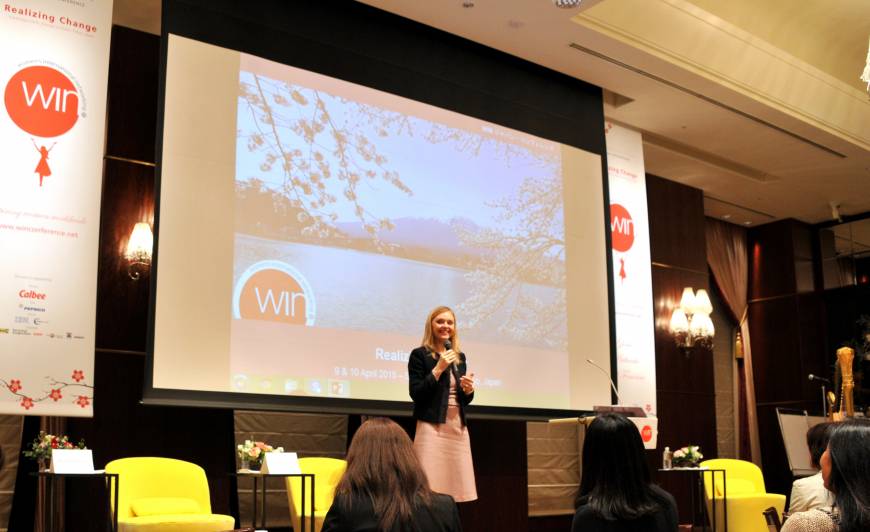By Magdalena Osumi
Japan Times, Tokyo.
A two-day conference aimed at empowering and inspiring women to bring about social change and elevate them as leaders was held last week in Tokyo, highlighting the need for greater diversity in the workplace.
The Women’s International Networking Conference was founded in 1997 by Norwegian social entrepreneur Kristin Engvig. It has since become an internationally recognized learning platform, attracting thousands of female leaders at various venues worldwide.
Japan hosted the event for the fifth time this year, on April 9 and 10, amid Prime Minister Shinzo Abe’s call to create a society where “all women can shine.” Some 220 men and women gathered to listen to and share their experiences on how to embrace diversity.
Speakers included Lower House member Seiko Noda and Sayaka Osakabe, founder of Matahara Net, an NPO fighting against maternity harassment.
“Often change starts with an idea we have in our mind, a plan on our computer, and I think that’s what many people have: great plans,” Engvig said during an opening ceremony, encouraging attendees to “look at our authentic leadership, how each and every one of us can contribute.”
She added that realizing change — the theme of this year’s event — requires openness, commitment and a will to contribute.
“For me, diversity and inclusion does not happen by default, it needs to be a conscious decision and effort by everyone, and it starts with me, my attitude,” said Peter List, president and CEO of IKEA Japan K.K.
List said that all of his employees are full-time employees, who are equally encouraged to balance their work and life.
“Everybody is unique, everyone is a talent, everyone has something to bring to contribute,” he said, adding that the company’s labor policies are designed to be flexible enough to meet the needs of employees with different life situations, enabling them to be more productive.
Snofrid Emterud, counselor at the Norwegian Embassy in Tokyo, recalled Norway’s movement in the 1970s to extend women’s rights and ensure equal opportunities and economic equality. In the ’70s, Norway was facing demographic challenges similar to those seen in Japan today, and its experience could hold answers for Japanese society.
“If women are to change and society is to change, men have to change too,” she said. She added that diversity should also be promoted regardless of age.
“This is not about charity and it’s not about being nice, but it’s about creating competitive businesses,” Emterud said, adding that many surveys prove that gender and cultural diversity contribute to success in business, and eventually to national economic prosperity.
Leanne Cutts, Kraft Foods Group Inc.’s marketing president for the Asia-Pacific region, spoke about the company’s efforts to support women taking maternity leave. She suggested that companies should create an environment where women can utilize their skills and fully contribute while raising children, making sure that effective policies are not only “in place” but also “in use.”
“You should never be satisfied (with results),” IBM Japan Ltd.’s Yukiko Shiozaki commented after her presentation, in which she addressed the U.S. tech giant’s efforts to promote diversity over the past century. She pointed out that diversity does not only refer to women but also people with disabilities, and sexual minorities.
That view was shared by panelist Hikari Igarashi, a student at Tokyo’s Sacred Heart University who said that “everyone, regardless of their gender identity, should be provided with equal opportunities to utilize their potential and actively participate in society.”
“I hope that by 2020, terms such as ikumen, used to describe men taking an active role in ikuji (child rearing), will not be used anymore as it will come naturally,” she said.
Broader aspects of diversity was also the theme of an inaugural event held on the sidelines of the conference, targeted at students and hosted by the Embassy of Norway.
The event was initiated to help youth develop an international mindset and deepen their understanding of social issues and demands arising from globalization. It was aimed at giving a younger generation, including students as well as current and future business entrepreneurs, networking opportunities.
“There are things people can do, notice or tell others about only because they can’t walk, see or hear, because they are different,” said one of the speakers and panelists, Toshiya Kakiuchi, 26, who was diagnosed with dysosteogenesis, a bone condition, as a child and uses a wheelchair.
Kakiuchi set up the universal design consultancy Mirairo in 2010 to address the need for diverse products and services for people like himself. “We can transform barriers into values,” Kakiuchi said.
Yusuke Asami, a 21-year-old student at Taisho University in Tokyo who attended the event, sees a need for a change in Japan so that employment opportunities are provided equally to women and men, as well as foreigners, lesbian, gay, bisexual and transgender people.
“I believe that diversity is what Japan lacks the most at the moment,” said Daiki Komuro, a 25-year-old consultant who also attended the youth event.
He blamed Japan’s reluctance to embrace diversity on its conservative business culture.
“Changing the society and politicians might be difficult. But we can start from ourselves and make smaller changes in families, the smallest unit of society.”














































































































































































































































































































































































